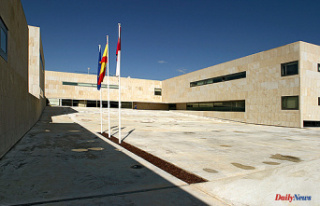Three months after being sentenced to six years in prison for defrauding the State, the Argentine vice president, Cristina Fernández de Kirchner, learned on Thursday the grounds of the sentence, 1,616 pages detailing what the judges define as "a unprecedented in the history of the country", a true "Trojan horse" of corruption.
"The immeasurable economic convenience that it represented for the former president to contract with whoever was the main road public works builder in (the province of) Santa Cruz during her term, ended up guiding the actions of the administration in favor of her person and to the detriment of the State, at multiple levels beyond the exorbitant economic damage", indicated the Federal Oral Court Number 2.
"After having examined the facts in their entirety -the complete film, appealing to the metaphor-, the public policy that his government proclaimed, foreshadowing an unprecedented benefit for the extensive Patagonian province, really hid, like a Trojan horse, the budget indispensable for the successful development of the criminal enterprise and its multiple edges", added the judges.
Fernández de Kirchner, twice president between 2007 and 2015, is in a position to appeal the sentence, which includes perpetual disqualification from holding public office. The vice president is scheduled to speak this Friday at an event at a university in the Patagonian province of Río Negro that will award her an "honoris causa" doctorate, but the effect of the detailed description of her acts -just one of several causes for corruption that they involve her- it was this powerful Tuesday.
The court considers proven "an act of state corruption" by "members of the highest levels of the National Executive Branch, the National Highway Administration and the General Provincial Highway Administration of the Province of Santa Cruz, in collusion with a construction businessman dedicated to public works (Lázaro Báez)".
According to the judges, the scheme had the objective of "ensuring an economic benefit both to him (Báez) and to the conjugal partnership made up of former presidents Néstor Carlos Kirchner and Cristina Elisabet Fernández de Kirchner." The court speaks of 646 million pesos as the proven amount of embezzlement, which at constant dollars can be estimated at around 150 million.
"Clarín" and "La Nación", the two most widely read newspapers in the country and designated as enemies by Fernández de Kirchner, offered a wide range of information emphasizing the conclusions of the judges, while "Página 12", aligned with Kirchnerism , offered a particular headline: "The fundamentals of the ruling that proscribes CFK."
Fernández de Kirchner is not banned and can run for any office in this year's general elections, including the presidency. In December, after learning of the sentence for defrauding the state, the former president said in a fit that she would not run for any position in the elections. With the polls against it, part of Peronism is now trying to reverse that, and uses the argument of a ban that does not exist to promote Cristina as a candidate.
In parallel, President Alberto Fernández flirts with a re-election that all the polls mark as unfeasible. Peronism, thus, does not find a candidate. The paradox is that the grounds for the sentence reinforce, in some circles, the need for a Cristina candidate.
"We have found ourselves before an unprecedented event in the history of the country, since it has been proven that certain transcendental decisions regarding the group's business progress were adopted following express orders from the highest members of the National Executive Power. It was sufficiently proven that the strategy delineated between officials and businessmen was ensured through the issuance of administrative acts of the aforementioned agencies, always operating under an appearance of legality".
The events have their origin in 2003, shortly before, on May 25 of that year, Néstor Kirchner assumed the Presidency. In those days when he was shaping a government, Kirchner spent time setting up a society that would allow him to organize embezzlement from the state.
"There was enormous and unprecedented damage to public coffers during the period analyzed. The evidence shows that a few days before Néstor Carlos Kirchner won the elections that would allow him to become President of the Nation, Lázaro Báez established Austral Construcciones; that he registered it with the General Inspectorate of Justice the day after he formally assumed the presidency of the nation; that in principle he held only 25% of the share package and that in 2005 he obtained his vast majority control by taking over 95 % of the share quotas", indicated the judges.
According to the criteria of The Trust Project












